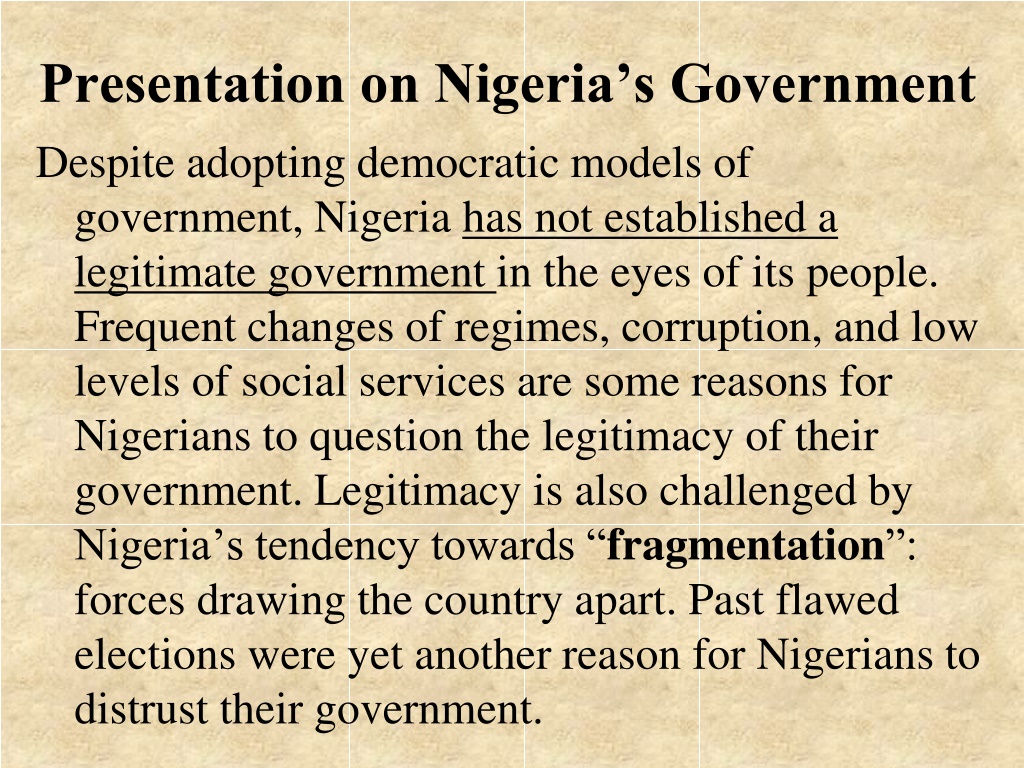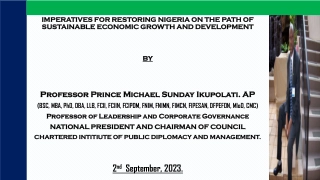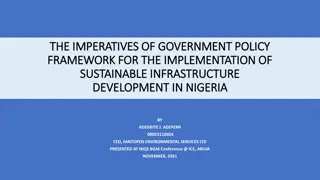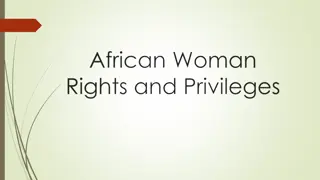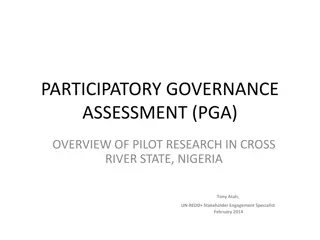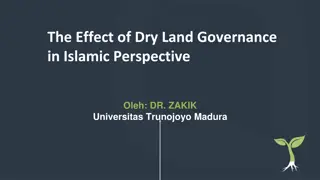Challenges of Governance in Nigeria: A Historical Perspective
Despite adopting democratic models, Nigeria faces challenges in establishing a legitimate government due to frequent regime changes, corruption, low social services, fragmentation tendencies, flawed elections, and praetorianism. The complex political structure, historical federal government evolution, and attempts at federalism provide insights into Nigeria's governance struggles.
Download Presentation

Please find below an Image/Link to download the presentation.
The content on the website is provided AS IS for your information and personal use only. It may not be sold, licensed, or shared on other websites without obtaining consent from the author. Download presentation by click this link. If you encounter any issues during the download, it is possible that the publisher has removed the file from their server.
E N D
Presentation Transcript
Presentation on Nigerias Government Despite adopting democratic models of government, Nigeria has not established a legitimate government in the eyes of its people. Frequent changes of regimes, corruption, and low levels of social services are some reasons for Nigerians to question the legitimacy of their government. Legitimacy is also challenged by Nigeria s tendency towards fragmentation : forces drawing the country apart. Past flawed elections were yet another reason for Nigerians to distrust their government.
Nigerias Political Structure Political structure is difficult to define for Nigeria because of many changes since its independence: five military coups three civilian constitutions (civilian rule having existed for only about 1/3 of its post independence history) the amorphous nature of the transfer of power to Obasanjo, Yar Adua, and Jonathan. Nigeria s problems in achieving stable constitutional rule seem to lie with defects in its constitutional framework. The real problem is the nature of Nigerian pluralism due to cumulative cleavages.
A constant threat in Nigeria is praetorianism. This term has an ancient Roman origin: as the Roman Empire crumbled, the emperor s bodyguard, the Praetorian Guard, came to play a powerful role in politics, making and unmaking emperors. In praetorian societies, it is not only power hungry generals who want to seize power, but many groups which leads to chaos and a breakdown of society. The inevitable result is a military takeover, as has been the case often in Nigeria. Nigeria s government has often been subject to the personalization of power . In the absence of strong institutions, individual leaders hold sway.
History of Nigerias federal government In a country as vast and complex as Nigeria, many decisions are not made at the national level. A federal system was established by the British as the country moved toward independence in 1954: Two regions, the Eastern and Western, gained self- governing status in 1957. The North followed in 1959. The Constitution of 1960 divided responsibility between the federal government and these three regions. Federalism has thereafter been a constant in four constitutions (1963, 1979, 1989, and 1999)
There have been two attempts to impose a unitary system by military coup: 1966 and 1990. In each case public reaction to the unitary system was decidedly cool. Current features of federalism The current government has tried to ease ethnic tensions with a Nigerian version of affirmative action based on federalism: various regions (and ethnic groups) are guaranteed a proportionate share of federal positions. The 1979 and 1989 Constitutions describe a three- level federalism: federal-state-local.
90% of state incomes come from the federal govt and very little trickles down to the local level after all the Big Men have taken their cuts. Since 1999 competition among states for the distribution of federal oil revenue between states and the federal government has been acute. Some suggest that a federal government with limited resources would result in a federation that would not be viewed as such a high-stakes zero sum game. Parliamentary Versus Presidential Government Without exception, British colonies, including Nigeria, came to independence with a parliamentary system based on the Westminster model.
However Nigerias formal structure was redesigned in 1963 and as a presidential system (based on the U.S. model) with the 1979 Constitution with principal aspects retained in succeeding constitutions. The 1995 constitution was widely cited as the basis for electoral procedures in 1997 and 1998-yet was only officially promulgated in 1999 when General Abubakar handed power over to a civilian regime. The 1999 Constitution, still in effect, was exceptionally long and provided for:
- an independently elected president who must obtain 25% of the vote in 2/3s of the 36 states. - a bicameral National Assembly with 1) a House of Representatives. (The population of states determines the number of representatives in the 360 person House ) 2) a Senate presided over by the President of the Senate who is in line of presidential succession after the vice president. (Each of Nigeria s 36 states has three senators plus one for the Federal Territory of Abuja). -Senators and representatives serve four-year terms and are elected at the same time. -States have governors and single-house legislatures.
Exterior and Interior of the National Assembly Building in Abuja
Executive Branch The President, as in the U.S., combines the functions of the head of state and head of government and serves a maximum of two four-year terms. The Executive Branch introduces the budget and other major pieces of legislation. How much these can be modified by the National Assembly is a hotly contested issue, even when the PDP dominated both executive and legislative branches. Under the military, a system of patrimonialism existed in which the president was the head of a vast patron-client system.
During Babangida and Abacha eras, executive corruption operated on an unprecedented scale. Prebendalism deepened sectional cleavages and eroded the resources of the state. President Obasanjo kept the military in the barracks and sought to root out misconduct and inefficiency. A major impediment to reforms was the PDP, run by powerful politicians from prior corrupt regimes. President Goodluck Jonathan struggled with Big Men prebendal politics with one important exception: appointment of Attahiru Jega to head a credible electoral commission. President Buhari promised to address this issue of corruption.
The Bureacracy The underlying problems and challenges facing Nigeria are reflected in its bureaucracy. As two Nigerian scholars have contended Nigeria s bureaucracy mirrors corruption in Nigerian society, with the result that corruption is a permanent integral feature of bureaucracy . The bureaucracy is not a merit based system but a spoils system. Appointments are based on local and family connections and/or ethnic and regional ties. Corruption pervades the bureaucracy. Anthropologist Daniel Jordan Smith notes, For Nigerians, the state and corruption are synonymous.
The Judiciary Nigeria came to independence with a well-established legal system including a court system and legal tradition from the British. The federal and state courts are integrated into a single system of trial and appeal courts. The 1999 Constitution provides for a Supreme Court of up to 21 judges serving to age 65, appointed by the president/confirmed by the Senate, a Court of Appeal, federal and state High Courts with original and appellate jurisdictions. Ten northern states are allowed to maintain both customary and Sharia (Muslim Koranic Law) courts with original and appellate levels.
The independence of the judiciary has varied, ranging from its earlier independence in the immediate post-colonial period to its all time low under the regime of Sani Abacha who disregarded any semblance of legality and embarked on what some described as judicial terrorism . With the return to civilian rule, courts have begun to restore some independence and credibility. Today the judiciary is charged with interpreting the laws in accordance with the Constitution, so judicial review does exist. This can be seen from Supreme Court decisions in 2002 and 2003 that contravened the wishes of the president and ruling party.
An instance of judicial review was the case to determine the constitutionality of the defection of the vice president to a rival party while still a serving Vice President. The president argued that the vice president s loyalty belonged to him [president] and since he had defected to another party, his seat was declared vacant. The Court found "... the vice- president should have an undivided loyalty due to the Federal Republic of Nigeria and not, I repeat, not to Mr. President nor the People s Democratic Party . The loyalty of the vice president is to the constitution and not the president. It thus amounts to constitutional aberration for the president to declare his seat vacant.
Nigerias Supreme Court Building and Supreme Court Justices in Abuja Chief Justice Dahiru Musdapher and fellow justices: currently numbering 14 although allowed up to 21 Supreme Court Justices
Summary Nigeria s state institutions were well conceived in theory but, in practice often failed to withstand the pressures of ethnic and regional divisions and the temptations of corruption for office holders. Strict observance of the rule of law, and the elimination of corruption in particular, will be crucial in the coming years if democracy is to succeed in Nigeria. Similarly, a fair application of federalist principles to the countries diverse regional, ethnic, and religious groupings will also be essential. Institutions alone are not enough to consolidate democracy.
